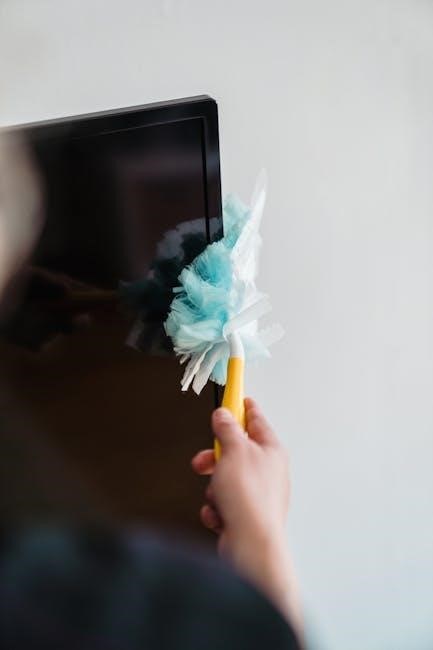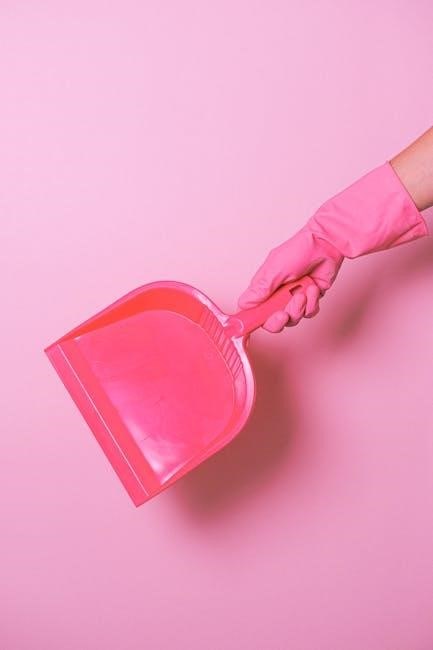Quartz countertops are a popular choice for modern kitchens and bathrooms due to their durability and low-maintenance requirements․ Made from engineered stone, they offer a sleek, uniform appearance and exceptional resistance to stains and scratches․ Unlike natural stone, quartz does not need sealing, making it a practical option for busy households․ Its non-porous surface ensures easy cleaning and prevents bacterial growth, while its versatility in design allows it to complement various interior styles․ Understanding proper care and maintenance techniques can extend the lifespan of quartz surfaces, keeping them looking pristine for years to come․
Benefits of Quartz Countertops
Quartz countertops offer exceptional durability, resistance to scratches, and a non-porous surface that prevents stains and bacterial growth․ They are low-maintenance, requiring only mild soap and water for cleaning, and never need sealing․ Quartz is highly resistant to heat and spills, making it ideal for busy kitchens․ Its uniform appearance and wide range of colors provide a sleek, modern aesthetic․ Additionally, quartz is environmentally friendly, as it is made from recycled materials․ These benefits make it a practical and stylish choice for homeowners seeking long-lasting surfaces․
Importance of Proper Care
Proper care is essential to maintain the beauty and durability of quartz countertops․ Regular cleaning prevents stains and bacteria growth, while avoiding harsh chemicals ensures the surface remains unharmed․ Neglecting care can lead to stubborn stains and dullness, compromising the countertop’s appearance․ Consistent maintenance with mild soap and water preserves its shine and structural integrity․ By following care guidelines, homeowners can ensure their quartz surfaces remain pristine and functional for years, protecting their investment and enhancing their home’s appeal․
Daily Cleaning Routine
A daily cleaning routine for quartz involves using mild soap and warm water with a soft cloth, wiping down surfaces regularly to prevent stains․
Mild Soap and Water Method
Cleaning quartz countertops with mild soap and warm water is a straightforward and effective method․ Mix a small amount of dish soap with warm water, dip a soft cloth or sponge, and gently wipe the surface․ Avoid harsh chemicals or abrasive materials, as they may dull the finish․ Regular use of this method prevents stains and maintains the surface’s shine․ It’s essential to rinse thoroughly and dry the countertop to prevent streaks, ensuring a pristine appearance․ This approach is ideal for daily maintenance and preserves the durability of your quartz countertops․
Soft Cloth or Sponge Usage
Using a soft, clean cloth or sponge is essential for maintaining quartz countertops․ These tools are gentle on the surface and prevent scratches․ For daily cleaning, dampen the cloth with warm water and a mild soap solution, then wipe down the countertop․ Avoid using abrasive scrubbers or paper towels, as they may damage the finish․ Microfiber cloths are ideal for streak-free results․ Always clean in a circular motion and dry the surface thoroughly to prevent water spots, ensuring the quartz remains in optimal condition․

Common Stains and How to Remove Them
Quartz surfaces can experience stains from coffee, wine, ink, and grease․ Prompt cleaning is key to preventing permanent marks․ Use mild soap or specialized cleaners to address stains effectively․
Organic Stains (Coffee, Tea, Wine)
Organic stains like coffee, tea, and wine can mar quartz surfaces if left untreated․ Act quickly by blotting spills with a soft cloth to prevent absorption․ For fresh stains, mix mild dish soap with warm water, apply gently with a soft sponge, and rinse thoroughly․ Stubborn stains may require a vinegar and water solution or a gentle abrasive cleaner․ Avoid harsh chemicals, as they can dull the surface; Regular cleaning and prompt attention to spills ensure long-lasting beauty and resilience of your quartz countertops․
Ink and Grease Stains
Ink and grease stains require immediate attention to prevent permanent damage․ For ink, blot the area with a clean cloth to absorb excess․ Gently clean with a mild soap and water solution, working in small circles․ Grease stains can be tackled with a degreaser or a vinegar and water mixture․ Avoid harsh chemicals or abrasive cleaners, as they may dull the surface․ For stubborn marks, professional quartz cleaning products can be effective․ Always rinse thoroughly and dry to maintain the surface’s shine and integrity․

Deep Cleaning and Stain Removal
For deep cleaning and stubborn stains, use a vinegar and water solution or professional quartz cleaners․ Avoid harsh chemicals to prevent surface damage and maintain appearance․
Vinegar and Water Solution
A mixture of equal parts vinegar and water is effective for deep cleaning and removing stubborn stains on quartz surfaces․ This solution is gentle yet powerful, especially on non-porous materials like quartz․ Apply the solution to the stained area, let it sit briefly, then wipe clean with a soft cloth․ Regular use helps maintain the surface’s shine and prevents grime buildup․ Avoid harsh chemicals and abrasive materials to preserve the countertop’s integrity and appearance․
Professional Cleaning Products
For tougher stains or deep cleaning, professional cleaning products specifically designed for quartz surfaces are highly effective․ These products are gentle yet powerful, ensuring they won’t damage the countertop’s finish․ Many manufacturers provide approved cleaning agents that safely remove grease, ink, and stubborn marks․ Always follow the product instructions to avoid abrasion․ Professional cleaners are ideal for maintaining the surface’s shine and preventing long-term damage․ Regular use of these products keeps your quartz countertops looking like new for years․

Preventive Measures
Using cutting boards and trivets prevents scratches and heat damage․ Avoid harsh chemicals to maintain the surface finish․ Address spills promptly to prevent stains from forming․
Using Cutting Boards and Trivets
Using cutting boards and trivets is essential to protect your quartz countertops from scratches and heat damage․ Place cutting boards under knives and sharp objects to prevent surface abrasions․ Trivets or heat-resistant mats should be used for hot pans, as direct heat can cause discoloration or cracks․ These simple precautions help maintain the countertop’s appearance and ensure its longevity․ Consistent use of these items is a key part of proper quartz care and maintenance․
Avoiding Harsh Chemicals
Avoiding harsh chemicals is crucial for maintaining the integrity of quartz countertops․ Never use bleach, ammonia, or abrasive cleaners, as they can dull the surface or cause discoloration․ Acidic substances, like vinegar, should also be avoided, as they may etch the material; Instead, opt for mild, pH-neutral cleaners specifically designed for quartz․ Always read product labels and test a small area first․ Prevent damage by keeping harsh chemicals away, ensuring your countertops remain vibrant and undamaged for years to come․

Long-Term Maintenance
Regular inspections and professional advice ensure quartz countertops retain their appearance․ Periodic checks help identify potential issues early, while avoiding harsh chemicals maintains their durability and aesthetic appeal․
Professional Advice
Consulting professionals ensures optimal quartz care․ Experts recommend using mild dish soap and water for daily cleaning, avoiding harsh chemicals․ Manufacturers often provide approved cleaning agents to maintain surface integrity․ For stubborn stains, professional-grade cleaners may be suggested․ Regular inspections by installers can prevent long-term damage․ Always follow manufacturer guidelines for specific quartz types, as some may require unique care․ Professional advice ensures your quartz countertops remain durable and retain their original shine, prolonging their lifespan significantly․
Periodic Checks
Regular inspections are crucial for maintaining quartz countertops’ longevity․ Check for scratches, spills, or stains that may have been missed during daily cleaning․ Inspect high-traffic areas and under appliances for potential damage․ Ensure no harsh chemicals or abrasive cleaners have been used, as they can dull the surface․ Address any issues promptly to prevent them from worsening․ Periodic checks help maintain the surface’s appearance and ensure it remains in optimal condition for years․ This proactive approach safeguards your investment in quartz countertops․

Restoring Shine
Restoring shine to quartz countertops involves gentle polishing techniques and specialized products designed to maintain their glossy finish without damaging the surface․
Polishing Techniques
Polishing quartz countertops involves using gentle, non-abrasive methods to restore their shine․ A microfiber cloth and mild dish soap can effectively remove dullness․ For deeper shine restoration, specialized quartz cleaners or a vinegar and water solution can be used․ Avoid harsh chemicals or abrasive sponges, as they may dull the surface․ Regular polishing maintains the countertop’s glossy finish and prevents scratches․ Always test a small area first to ensure the product suits your quartz type․ Consistent care ensures long-lasting brilliance and durability․
Products for Shine Restoration
Specialized quartz cleaners, mild dish soap, and vinegar solutions are effective for restoring shine․ CIF cream cleaner, a mild abrasive, can gently remove stains and enhance luster․ Always use products specifically designed for quartz to avoid damage․ Apply the cleaner with a soft cloth in circular motions, rinse thoroughly, and dry․ Regular use of these products maintains the surface’s gloss and prevents dullness․ Testing a small area first ensures compatibility and avoids unwanted results․

Comparison with Other Materials
Quartz surpasses granite and marble in durability and low maintenance․ Its non-porous surface resists stains and scratches better, eliminating the need for sealing required by natural stones․
Quartz vs․ Granite
Quartz and granite differ significantly in maintenance and durability․ Quartz is non-porous, resisting stains and bacteria without sealing, while granite requires periodic sealing․ Granite offers natural beauty and durability but is more prone to etching and staining․ Quartz is engineered for consistency and lower upkeep, making it ideal for busy households․ Both materials are durable, but quartz is more resistant to scratches and heat, providing a practical choice for long-term use in high-traffic areas․
Quartz vs․ Marble
Quartz and marble differ significantly in care and maintenance․ Quartz is non-porous, resisting stains and bacteria, while marble is porous and requires sealing․ Marble is prone to etching and staining, needing more attention․ Quartz is more durable and low-maintenance, ideal for busy households․ Marble offers natural elegance but demands careful cleaning and protection․ Quartz is resistant to scratches and heat, making it a practical choice for longevity and ease of upkeep in high-traffic areas, while marble requires more vigilance to maintain its beauty and functionality over time․
Quartz countertops offer durability and low-maintenance convenience, lasting 15-20 years with proper care․ Regular cleaning with mild soap and water ensures their longevity and shine, avoiding harsh chemicals for optimal preservation․
For optimal quartz care, use mild soap and warm water daily, avoiding harsh chemicals․ Blot spills immediately to prevent stains and dry surfaces to avoid streaks․ Employ trivets and cutting boards to protect against heat and sharp objects․ Regularly sanitize high-touch areas and avoid abrasive cleaners or scrubbers․ Periodically inspect the surface for wear and address any issues promptly․ Following these practices ensures your quartz remains pristine, maintaining its durability and aesthetic appeal over time․
Final Tips for Longevity
To ensure lasting durability, avoid using harsh chemicals or abrasive materials that could dull the surface․ Always use trivets or coasters for hot items and clean spills promptly, especially from substances like wine or ink․ Regularly sanitizing high-touch areas with gentle cleaners can prevent germ buildup․ For stubborn stains, consider professional cleaning products designed for quartz․ Addressing any damage or wear early helps maintain its appearance․ By following these tips, your quartz countertops will retain their beauty and functionality for many years․
